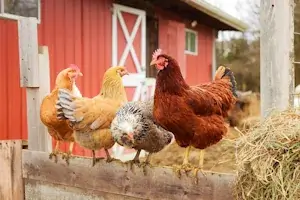Introduction: Why Keep Chickens?
The popularity of keeping chickens is growing – and for good reason! Chickens are not only charming pets but also productive egg-layers. Whether in the garden or on the farm, raising chickens brings joy, sustainability, and direct access to fresh, delicious eggs. In this article, you’ll learn everything you need to know to get started: from planning and building a chicken coop to care and feeding.
1. Requirements for Keeping Chickens
Is Chicken Keeping Allowed?
Before acquiring chickens, it’s essential to check local regulations. In many areas, keeping chickens in your garden is allowed as long as it’s done in a humane manner and does not disturb neighbors.
How Much Space Do Chickens Need?
Chickens need space to scratch, peck, and rest. For each chicken, you should plan at least 1 m² of coop space and 10 m² of run space. The more space they have, the happier and healthier they will be.
Choosing the Right Breed
Depending on your goals, you can choose from various chicken breeds:
- Laying Hens: For high egg production, breeds like Lohmann Brown or Sussex are ideal.
- Dual-purpose Hens: For both eggs and meat, breeds like Bielefelder or Rheinländer work well.
- Ornamental Hens: If you’re interested in appearance, Silkie chickens are a great choice.
2. The Ideal Chicken Coop
What Should Be in the Chicken Coop?
An appropriate coop is crucial for your chickens’ well-being. It should include:
- Perches: Chickens like to sleep elevated.
- Nesting Boxes: One nest per three hens.
- Ventilation: Fresh air is essential, but avoid drafts.
- Bedding: Straw or wood shavings keep the coop clean and comfortable.
Protection Against Predators
A secure coop is necessary to protect your chickens from foxes, martens, and birds of prey. Ensure the coop has a sturdy fence and secure doors.
Cleaning and Maintenance
A clean coop is vital for preventing diseases. Regularly remove droppings and change bedding. A weekly deep clean ensures hygiene.
3. Proper Nutrition for Chickens
What Do Chickens Eat?
Chickens are omnivores and require a balanced diet:
- Basic Feed: Grains such as wheat, corn, and barley.
- Greens: Grass, vegetable scraps, and kitchen leftovers.
- Protein Sources: Earthworms, insects, and special protein feeds.
- Calcium: Use crushed oyster shells or limestone for strong egg shells.
Don’t forget fresh water!
Chickens drink a lot of water, so ensure clean water is always available in a frost-free container.
4. Chicken Care and Health
How to Recognize Healthy Chickens
Healthy chickens are active, have shiny feathers, and clear eyes. Look for warning signs such as diarrhea, breathing problems, or lethargy, which may indicate illness.
Hygiene and Parasite Control
Chickens can be infested with parasites such as mites or lice. Regularly check their feathers and the coop. Special products from pet stores can help if needed.
Vaccinations and Vet Visits
In some regions, vaccinations are mandatory, such as for Newcastle disease. An annual check-up at the vet is recommended to maintain your chickens’ health.
5. Behavior and Enrichment
The Social Life of Chickens
Chickens are social animals and need company. A group of at least three to five chickens is ideal. They establish a pecking order and communicate through vocalizations and body language.
Enrichment Activities
Chickens love to stay busy. Provide enrichment options like:
- Foraging games (e.g., hiding food in the straw)
- Sand or dust baths for feather care
- Branches from trees for scratching and pecking
6. Benefits of Keeping Chickens
Fresh Eggs from Your Own Flock
Chickens can lay up to 300 eggs per year, depending on the breed. These eggs are not only delicious but also free from unnecessary additives.
Natural Pest Control
Chickens are excellent pest hunters. They will keep your garden free of snails, worms, and other pests.
Sustainability and Joy
Raising chickens is sustainable and reduces kitchen waste. Plus, the animals bring life and happiness to your daily routine.
7. Frequently Asked Questions About Keeping Chickens
Are Chickens Loud?
Laying hens are relatively quiet except when they are laying eggs. Roosters, however, crow and might disturb neighbors.
Can Chickens Stay Outside in Winter?
Yes, chickens are cold-resistant as long as they have a windproof coop. However, in winter, they need more food and water that doesn’t freeze.
How Many Chickens Should I Keep?
This depends on your space and needs. For fresh eggs, three to five chickens should be sufficient for a family.
Conclusion: Chicken Keeping – More Than Just a Hobby
Raising chickens is a rewarding experience. With proper preparation, a secure coop, and a balanced diet, you can provide a happy life for your chickens. They will reward you with fresh eggs, natural pest control, and joy in your daily life.

